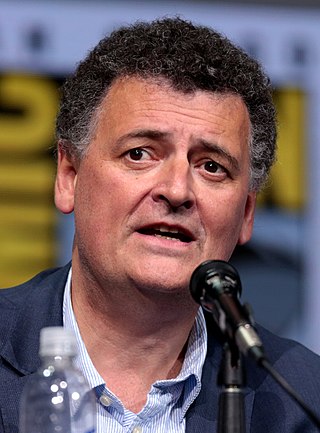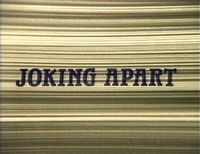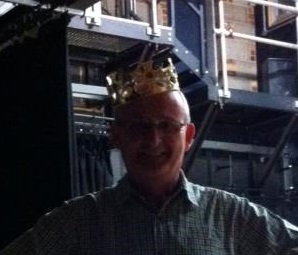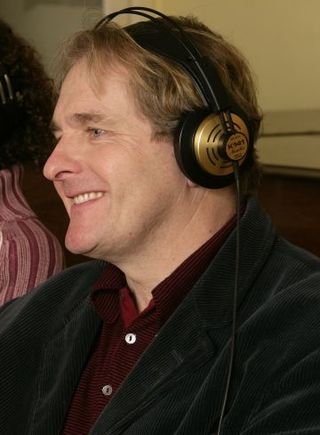
Press Gang is a British children's television comedy-drama consisting of 43 episodes across five series that were broadcast from 1989 to 1993. Produced by Richmond Film & Television for Central, it screened on the ITV network in its regular weekday afternoon children's strand, CITV, typically in a 4:45 pm slot.

Coupling is a British television sitcom written by Steven Moffat that aired on BBC Two and BBC Three from 12 May 2000 to 14 June 2004. Produced by Hartswood Films for the BBC, the show centres on the dating, sexual adventures, and mishaps of six friends in their early 30s, often depicting the three women and the three men each talking among themselves about the same events, but in entirely different terms.

Steven William Moffat is a Scottish television writer, television producer and screenwriter. He is best known for his work as the second showrunner and head writer of the 2005 revival of the BBC sci-fi television series Doctor Who, and co-creating and co-writing the contemporary crime drama television series Sherlock, based on Sir Arthur Conan Doyle's Sherlock Holmes stories. In the 2015 Birthday Honours, Moffat was appointed Officer of the Order of the British Empire (OBE) for his services to drama.
Robert Alexander Spiers was a Scottish television director and producer. He worked on many sitcoms, including Dad's Army and Are You Being Served?, and won two British Academy Television Awards for Fawlty Towers and Absolutely Fabulous. Spiers also directed the films That Darn Cat and Spice World, and Kevin of the North (2001).

Joking Apart is a BBC television sitcom written by Steven Moffat about the rise and fall of a relationship. It juxtaposes a couple, Mark and Becky, who fall in love and marry, before getting separated and finally divorced. The twelve episodes, broadcast between 1993 and 1995, were directed by Bob Spiers and produced by Andre Ptaszynski for independent production company Pola Jones.
"The Doctor Dances" is the tenth episode of the first series in the reboot of the British science fiction television programme Doctor Who, which was first broadcast on BBC One on 28 May 2005. It is the second of a two-part story, following the broadcast of "The Empty Child" on 21 May.

Chalk is a British television sitcom set in a comprehensive school named Galfast High. Two series, both written by Steven Moffat, were broadcast on BBC1 in 1997. Like Moffat's earlier sitcom Joking Apart, Chalk was produced by Andre Ptaszynski for Pola Jones.

Paul Raffield is a British academic, director and actor.

Robert Guy Bathurst is a British actor. Bathurst was born in The Gold Coast in 1957, where his father was working as a management consultant. In 1959, his family moved to Ballybrack, Dublin, Ireland, and Bathurst attended school in Killiney and later was enrolled at Headfort, an Irish boarding school. In 1966, the family moved back to England and Bathurst transferred to Worth School in Sussex, where he took up amateur dramatics. At the age of 18, he read law at Pembroke College, Cambridge, and joined the Footlights group.

Jekyll is a British television drama serial produced by Hartswood Films and Stagescreen Productions for BBC One. The series also received funding from BBC America. Steven Moffat wrote all six episodes, with Douglas Mackinnon and Matt Lipsey each directing three episodes.
André Ptaszynski was a British theatre and television producer. He was Chief Executive of the Really Useful Group from 2005 to 2011 and Chief Executive of Really Useful Theatres from 2000 to 2005.
Juliet May is a British television director. She has directed television shows such as Dalziel and Pascoe, Hope and Glory, New Tricks and Miranda.

Sherlock is a British mystery crime drama television series based on Sir Arthur Conan Doyle's Sherlock Holmes detective stories. Created by Steven Moffat and Mark Gatiss, the show stars Benedict Cumberbatch as Sherlock Holmes and Martin Freeman as Doctor John Watson. Thirteen episodes have been produced, with four three-part series airing from 2010 to 2017 and a special episode that aired on 1 January 2016. The series is set in the present day in which it aired, while the one-off special features a Victorian period fantasy resembling the original Holmes stories. Sherlock is produced by the British network BBC, along with Hartswood Films, with Moffat, Gatiss, Sue Vertue and Rebecca Eaton serving as executive producers. The series is supported by the American station WGBH-TV Boston for its Masterpiece anthology series on PBS, where it also airs in the United States. The series is primarily filmed in Cardiff, Wales, with North Gower Street in London used for exterior shots of Holmes and Watson's 221B Baker Street residence.

Susan Nicola Vertue is an English television producer, mainly of comedy shows, including Mr. Bean and Coupling. She is the daughter of producer Beryl Vertue.

The fifth series of the British science-fiction television programme Doctor Who was originally broadcast on BBC One in 2010. The series began on 3 April 2010 with "The Eleventh Hour", and ended with "The Big Bang" on 26 June 2010. The series is the first to be led by Steven Moffat, who took over as head writer and executive producer when Russell T Davies ended his involvement in the show after "The End of Time". The series has 13 episodes, six of which were written by Moffat. Piers Wenger and Beth Willis were co-executive producers, and Tracie Simpson and Peter Bennett were producers. Although it is the fifth series since the show's revival in 2005, the series' production code numbers were reset.
"The Time of Angels" is the fourth episode of the fifth series of the British science fiction television series Doctor Who, which was first broadcast on 24 April 2010 on BBC One. It is the first episode of a two-part story written by showrunner Steven Moffat and directed by Adam Smith; the second episode, "Flesh and Stone", aired on 1 May. Moffat utilised the two-part episode to bring back a couple of his previous creations: the Weeping Angels from his series three episode "Blink", and River Song from the series four episodes "Silence in the Library" and "Forest of the Dead".

"Space" and "Time" are two mini-episodes of the British science fiction television series Doctor Who. Written by the programme's head writer Steven Moffat and directed by Richard Senior, the mini-episodes were broadcast on 18 March 2011 as part of BBC One's Red Nose Day telethon for the charity Comic Relief.












